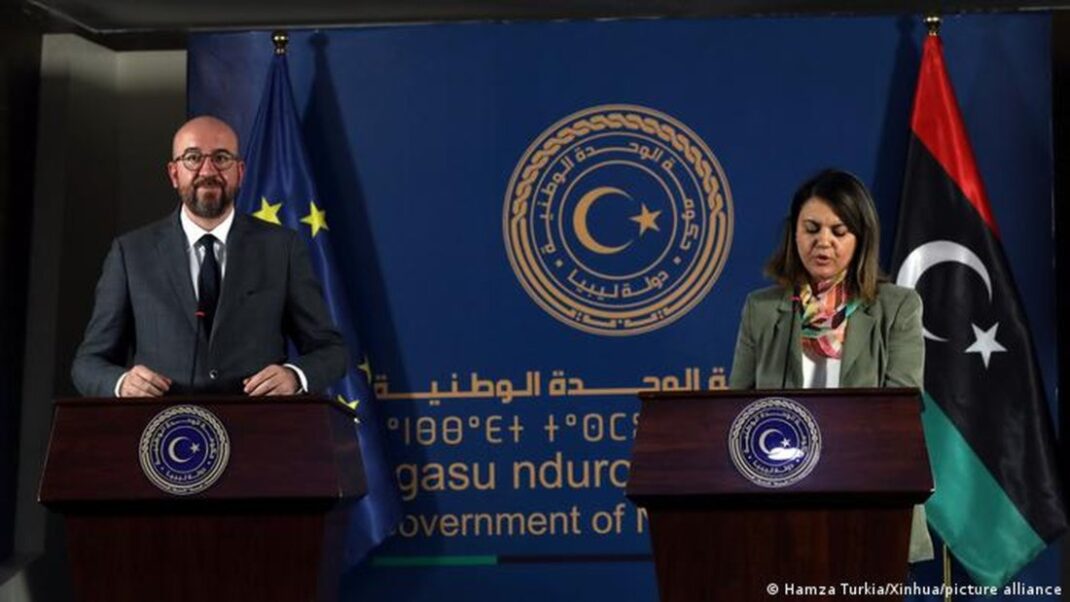Mary Fitzgerald
 The new government in Tripoli needs support — not what happened the last time around. Rarely has the Libyan capital played host to so many high-level visits from Europe as it has over the past month.
The new government in Tripoli needs support — not what happened the last time around. Rarely has the Libyan capital played host to so many high-level visits from Europe as it has over the past month.
Two weeks ago, the Italian, German and French foreign ministers landed in Tripoli for a joint visit. Last weekend European Council President Charles Michel was in town. This week, the Italian, Greek and Maltese prime ministers made separate trips.
The focus of all this attention is the newly installed Government of National Unity (GNU), Libya’s first unified authority since 2014 and the product of a U.N.-fostered process that followed a devastating war on Tripoli.
Hopes are high that the new government will be able to consolidate the fragile stability that has been so painfully won. For that to happen, however, European leaders will have to demonstrate they’ve learned the lessons of what went wrong the last time around — and work together to assist the legitimate government rather than export their own rivalries into the already fractious country.
When Michel touched down on Sunday, many Libyans were noting the second anniversary of the start of the Tripoli war, when Khalifa Haftar, a commander based in eastern Libya backed by the United Arab Emirates, Russia and Egypt, launched an offensive against the then internationally recognized authority (known as the Government of National Accord or GNA).
Haftar’s audacious move — he began the assault the day U.N. Secretary General Antonio Guterres was visiting to endorse an imminent peace conference — sparked 18 months of fighting, drew in foreign mercenaries on all sides, and further internationalized Libya’s conflict.
It ended after Turkish intervention — at the GNA’s request — helped change the military balance of power and forced Haftar to retreat, along with the Russian mercenaries that had swollen his ranks.
That history is important not only because the Tripoli war still casts a long shadow inside Libya but also because in Europe official narratives of what happened — and how Europe responded — are often at odds with Libyan perceptions.
When Haftar upended peace efforts with his attack on the capital in 2019, Europeans generally seemed shy to censure him, sticking instead to “all sides” hand-wringing.
For those besieged by Haftar, it appeared the Europeans were dithering, or worse, waiting to see if the septuagenarian general could pull off a victory. The belief that tacit support from Paris emboldened Haftar has fed anti-French sentiment.
A ceasefire last October allowed the resumption of a U.N. process that drew on German diplomatic efforts and culminated in the Libyan Political Dialogue Forum (LPDF), out of which the new government emerged.
Comprised of Prime Minister Abdulhamid Dabaiba and a three-man presidency council, it has a limited mandate. Its main task is to shepherd the country towards national elections planned for December while tackling COVID-19 and improving basic services in the meantime.
Dabaiba’s appointment by the LPDF has been overshadowed by allegations of vote-buying.
A tycoon from the port city of Misrata, Dabaiba is keen to present Libya as open for business, a message that seems to have driven his recent discussions with European visitors. Diplomatic missions that evacuated to Tunis after Libya tipped into civil conflict in 2014 have been returning to the Libyan capital.
The French embassy reopened in late March. Both the U.S. and China have indicated they too would like to see their diplomats return. Tripoli buzzes with talk of reconstruction contracts and other investment deals. It’s tempting to get caught up in the optimism of this moment, but Europeans should heed the potential storm clouds on the horizon.
While it is true that Libya is in a better place than it was a year ago, no one should underestimate the difficulties ahead. The country’s new realities include increased Turkish influence in its west and an entrenched Russian presence further east, both of which the Europeans will have to navigate.
Haftar’s ambivalence towards the new government is noteworthy. Attempts to unify military forces show signs of slowing. Foreign fighters sent by Turkey on one side and Haftar’s allies on the other are still present, despite ceasefire pledges that they would leave by January.
What happens next will depend on the decisions that will take place in Tripoli — but also in European capitals. Holding nationwide elections in Libya eight months from now appears ambitious, not only because of the brittle security situation but also because the constitutional framework for such a ballot remains contested.
A rush by EU member states to pursue their own interests at such a delicate time risks repeating past mistakes and undercutting prospects for longer term stability.
Turkey’s involvement presents another challenge. Engaging with Ankara on Libya will be easier for some than others. During his visit to Tripoli this week, Greek Prime Minister Kyriakos Mitsotakis pushed for the annulling of the controversial deal on the delimitation of maritime zones which the GNA signed with Turkey in November 2019.
Given the challenges, a genuinely unified European effort to support the gains of recent months is key.
Too often Libyans have watched individual EU member states undermining the possibility of a joint approach that is constructive and effective. Restoring European credibility in Libya begins there.
***
Mary Fitzgerald is a researcher specializing in Libya.
__________




